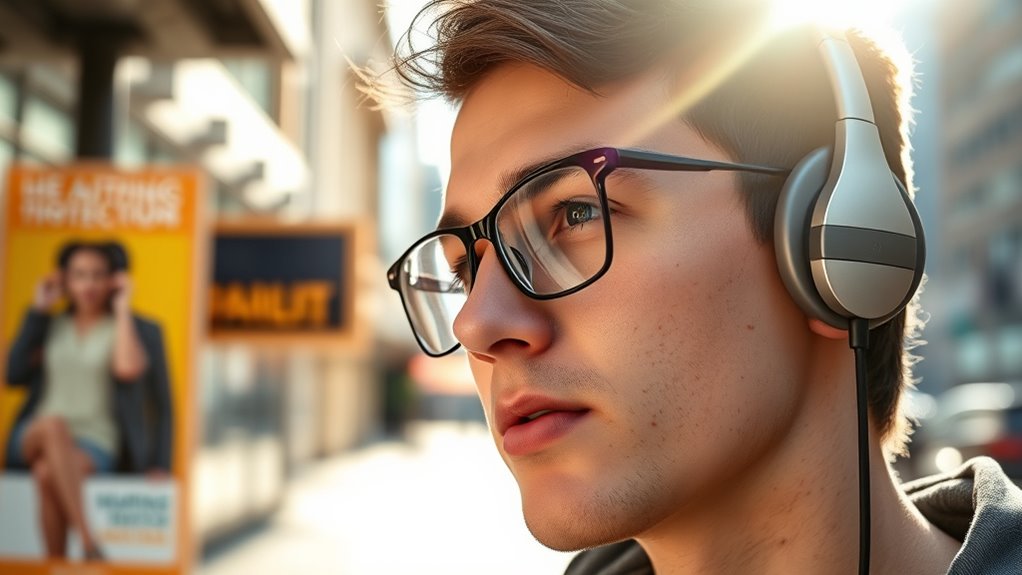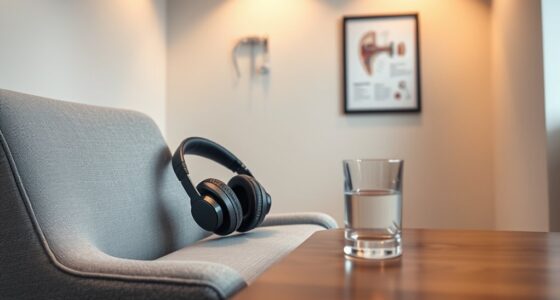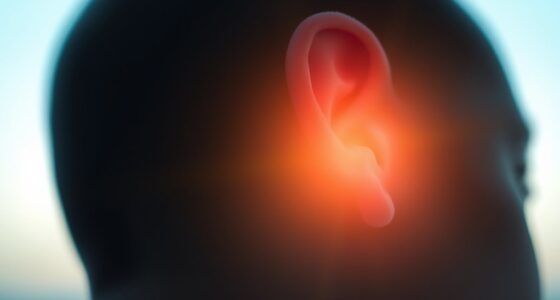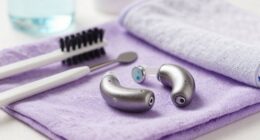To prevent noise-induced tinnitus, always protect your ears during loud events by wearing earplugs or noise-canceling headphones. Keep the volume low on devices and take breaks from extended noise exposure. Regular check-ups with an audiologist can catch early signs of damage. Incorporate calming sounds or music to help manage tinnitus if it occurs. Staying aware of safe listening habits now can make a big difference later—discover more ways to safeguard your hearing.
Key Takeaways
- Consistently wear hearing protection like earplugs or noise-canceling headphones during loud events.
- Keep device volume low and take regular breaks to reduce exposure to loud sounds.
- Educate yourself on safe listening habits and sound quality for long-term hearing health.
- Use sound masking techniques such as calming music or white noise to manage tinnitus symptoms.
- Schedule regular hearing check-ups and seek early intervention if hearing changes or tinnitus occur.

Noise-induced tinnitus, a ringing or buzzing sound in the ears caused by exposure to loud noise, is increasingly affecting young adults. If you’ve noticed persistent sounds after concerts, clubbing, or loud events, you’re not alone. Fortunately, there are effective ways to prevent further damage and manage symptoms. One of the most important steps you can take is prioritizing hearing protection. Wearing earplugs or noise-canceling headphones during loud activities reduces the risk of damaging your auditory system. Fit-tested earplugs are especially effective, as they block harmful decibel levels without distorting sound, allowing you to enjoy music, conversations, and events safely.
In addition to physical protection, exploring alternative therapies like music therapy can help you cope with tinnitus. Music therapy involves listening to carefully curated soundscapes or calming music designed to mask tinnitus sounds and promote relaxation. Many find that engaging with soothing melodies not only distracts from the ringing but also reduces stress, which can exacerbate tinnitus symptoms. Incorporating background music or white noise in your daily routine may help you habituate to the sounds, making them less intrusive over time. This non-invasive approach can be a valuable part of your overall tinnitus management plan.
Preventing noise-induced tinnitus isn’t just about avoiding loud environments; it’s about adopting consistent habits. Start by lowering the volume on your headphones and devices. If you’re attending a concert or sporting event, ensure you’re using ear protection, especially if you know you’ll be exposed for an extended period. Be mindful of your environment—if it sounds loud, take breaks or move to a quieter area. Regular hearing check-ups with an audiologist can catch early signs of damage, helping you take action before tinnitus worsens. Educating yourself on safe listening practices can empower you to make smarter choices about your auditory health. Additionally, understanding the importance of sound quality and fidelity in audio devices can help you select equipment that promotes safer listening levels.
Frequently Asked Questions
Can Tinnitus Be Completely Cured Once Caused by Noise Exposure?
You might wonder if tinnitus caused by noise exposure can be completely cured. Currently, tinnitus treatment options focus on managing symptoms rather than a total cure. Hearing protection methods can prevent worsening, but existing damage may be permanent. While some people experience relief through sound therapy or counseling, there’s no guaranteed way to fully eliminate tinnitus. Staying proactive with prevention and seeking early treatment offers your best chance to minimize its impact.
How Quickly Can Tinnitus Develop After Noise Exposure?
Tinnitus can develop quite rapidly after noise exposure, often with an acute onset within minutes to hours. You might notice a sudden ringing or buzzing in your ears shortly after loud sounds, indicating rapid development. This quick onset underscores the importance of protecting your hearing right away. If you experience symptoms, seek medical advice promptly to prevent further damage and explore possible management options.
Are Certain Music Genres More Likely to Cause Tinnitus?
Your music preferences and genre sensitivities can influence your risk of developing tinnitus. Loud genres like rock, metal, or electronic music often have higher sound levels, increasing the likelihood of noise-induced tinnitus. If you prefer these genres, you should take precautions like lowering volume and limiting exposure. Being mindful of your listening habits helps protect your hearing and reduces your risk of tinnitus, regardless of your favorite music style.
Is Tinnitus More Common in Males or Females?
When it comes to tinnitus, the grass isn’t always greener on one side; gender differences show that prevalence rates tend to be higher in males. You might think females are more prone, but data suggests men face this issue more often, especially with noise exposure. Understanding these differences helps you stay alert and take proactive steps, so you don’t end up caught off guard by the silent thief.
Do Earphones or Headphones Pose a Higher Risk for Tinnitus?
You might wonder if earphones or headphones pose a higher risk for tinnitus. Generally, earphones can be riskier because they sit closer to your eardrum, increasing sound exposure. To protect yourself, maintain good earphone hygiene and keep volume control habits in check. Lowering volume and taking breaks help prevent tinnitus. Being mindful of your listening habits is key to reducing your risk of noise-induced tinnitus.
Conclusion
To protect your ears from noise-induced tinnitus, think of your hearing as a fragile garden that needs careful tending. Always wear ear protection in loud environments, keep volume levels moderate, and take breaks from noise. By doing so, you’re planting seeds for healthier hearing and avoiding the storm of ringing that can drown out your daily life. Remember, your ears are the gateway to a world full of sound—treat them with the kindness they deserve.











